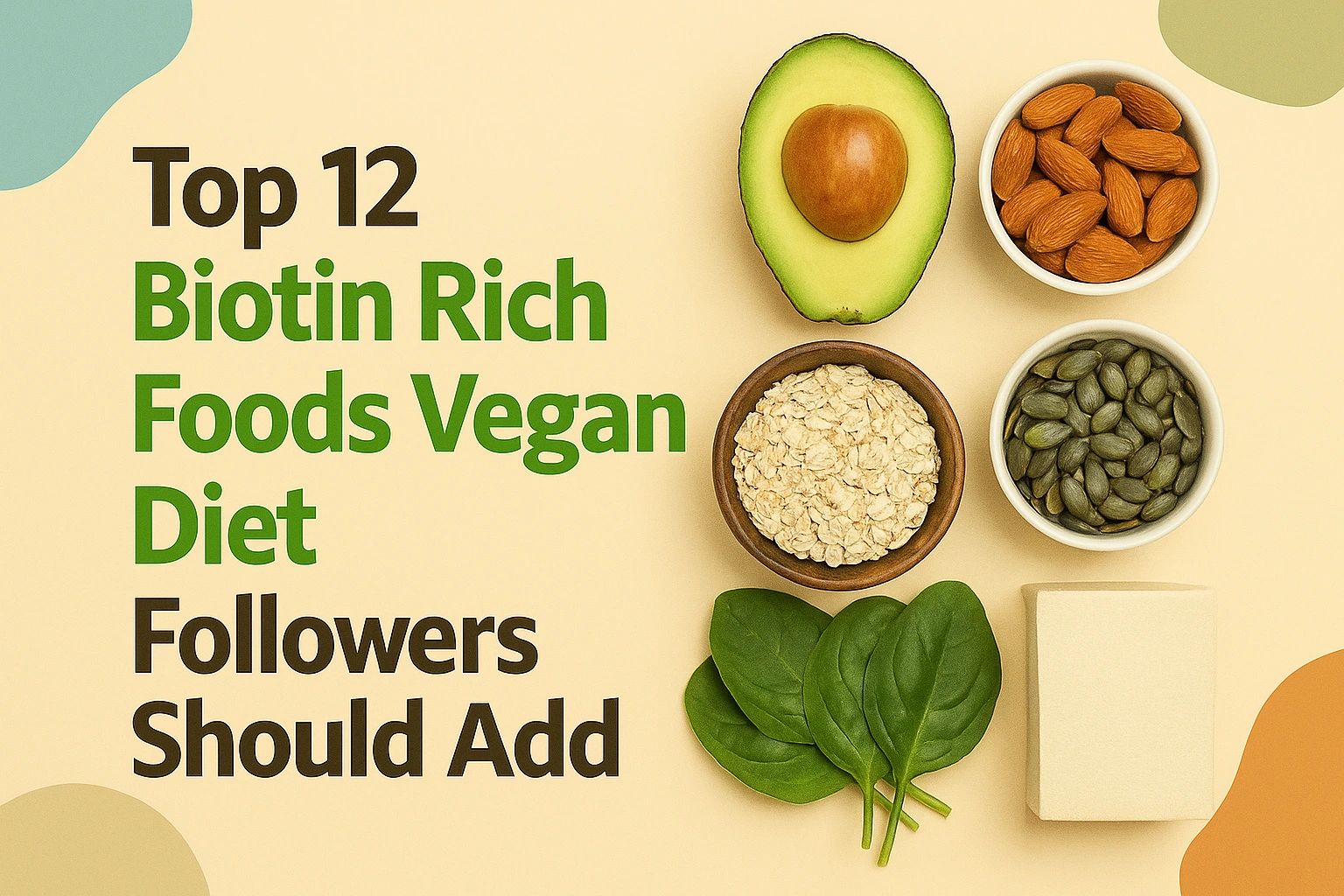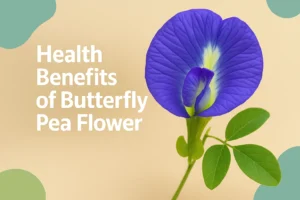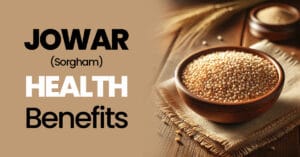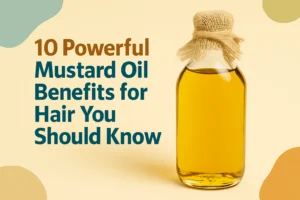If you’re following a plant-based lifestyle and want healthy skin, strong nails, and luscious hair, then adding biotin rich foods vegan style is a must. Biotin, also known as vitamin B7 or vitamin H, plays a vital role in converting food into energy, maintaining metabolic health, and supporting keratin production.
While biotin is often associated with eggs, meat, and dairy, plenty of plant-based options are also excellent sources of this essential nutrient. In this article, we’ll explore the top 12 biotin rich foods vegan diet followers can easily include in their meals. These natural, cruelty-free options not only support your biotin needs but also come packed with other essential vitamins and minerals.
Why Biotin Matters in a Vegan Diet
Biotin supports the metabolism of carbohydrates, fats, and proteins, helping your body produce energy. It’s especially vital for people on vegan diets because some common sources like eggs and liver are excluded.
A deficiency in biotin can lead to:
- Hair thinning or hair loss
- Brittle nails
- Dry or irritated skin
- Fatigue and muscle pain
That’s why finding biotin rich foods vegan friendly is key to maintaining your overall health while enjoying the benefits of plant based living.
1. Sweet Potatoes
Sweet potatoes are not just a tasty comfort food — they’re also one of the top biotin rich foods vegan diets can enjoy daily. One cup of cooked sweet potatoes provides around 2.4 micrograms of biotin, which helps support healthy hair, skin, and energy metabolism. In addition to biotin, sweet potatoes are packed with fiber, beta-carotene, and antioxidants that protect your cells and support vision health. These nutrients also help reduce inflammation and strengthen the immune system, making sweet potatoes an all rounder for overall wellness.
How to enjoy: Roast sweet potato wedges with olive oil and herbs, mash them with a touch of plant-based milk, or bake sweet potato fries for a delicious, nutrient-packed snack. You can also blend them into smoothies or add them to vegan pancakes for extra flavor and nutrition.
2. Sunflower Seeds
Sunflower seeds might be small, but they pack a serious nutritional punch. Just a quarter-cup can offer up to 2.6 micrograms of biotin, making them one of the most efficient biotin rich foods vegan followers can rely on for hair and skin health. These seeds are also full of vitamin E, magnesium, and healthy fats, which support your immune system and heart. Their crunchy texture and nutty flavor make them a perfect topping for many dishes.
Ways to use: Sprinkle roasted sunflower seeds on salads, add them to smoothie bowls, mix into trail mix, or grind them into homemade seed butter. You can even blend them into creamy sauces or use them in baking for a protein boost.
3. Almonds
Almonds are a crunchy, satisfying snack that happens to be one of the most versatile biotin rich foods vegan eaters can enjoy. A ¼ cup of almonds provides around 1.5 micrograms of biotin, along with vitamin E, fiber, and magnesium. These nutrients help promote glowing skin, strong hair, and a healthy heart. Almonds are also known for improving brain function and reducing inflammation, making them a smart choice for daily consumption.
Simple uses: Snack on raw almonds, blend them into almond butter, or use almond milk in your cereal or smoothies. Try adding crushed almonds to your oatmeal, yogurt bowls, or baked goods for a crunchy boost.
4. Spinach
Spinach is often praised for its iron content, but it’s also a surprising contributor to your biotin intake. A half-cup of cooked spinach gives about 0.5 micrograms of biotin, and although it may seem like a small amount, regular consumption adds up. It’s also rich in vitamin A, vitamin C, and plant-based iron, making it one of the most nutrient-dense biotin rich foods. Spinach supports eye health, boosts immunity, and promotes blood health.
Tasty ideas: Blend spinach into smoothies, stir it into lentil soups, or sauté with garlic and olive oil for a simple side dish. You can also bake it into muffins or toss it into pasta and curry dishes for extra nutrition.
5. Oats
Oats are an essential breakfast choice that fit perfectly into any plant-based diet. Depending on the type, a cup of oats can provide between 0.2 and 0.6 micrograms of biotin. Oats are not only one of the easiest biotin rich foods vegan households keep stocked, but they also contain beta-glucan — a special fiber known to support cholesterol levels and digestion. They help stabilize blood sugar and keep you full for longer, which supports weight management.
Delicious ways to use: Try overnight oats soaked with fruits and seeds, make warm oatmeal with almond milk, or use oat flour in pancakes and muffins. Oats are also a great base for granola or healthy snack bars.
6. Legumes (Lentils, Chickpeas, Peas)
Legumes like lentils, chickpeas, and peas are amazing plant-based protein sources — and they’re also solid biotin rich foods vegan meal plans should include. A cup of cooked lentils can provide about 1.3 micrograms of biotin, plus a hearty dose of fiber, folate, and iron. These nutrients help keep your energy levels stable and your muscles strong. Legumes also support digestion and help regulate blood sugar.
Cooking ideas: Make spiced lentil soup, whip up creamy hummus with chickpeas, or prepare roasted chickpeas for a crunchy, healthy snack. Add them to salads, stews, curries, or even blend into veggie burgers.
7. Nutritional Yeast
Nutritional yeast, or “nooch” as it’s fondly called, is a vegan favorite for its cheesy flavor and impressive nutrient profile. Fortified versions can offer up to 21 micrograms of biotin per tablespoon — far exceeding your daily requirement. This makes it one of the most powerful biotin rich foods vegan diets can benefit from. It’s also a complete protein and full of B-vitamins, which are vital for energy production and nervous system health.
How to use: Sprinkle on popcorn, stir into mashed potatoes, or use as a base for creamy vegan cheese sauces. You can also blend it into dips, pasta sauces, or even soups for extra flavor and nutrition.
8. Mushrooms (Especially White Button)
White button mushrooms aren’t just flavorful — they’re also one of the most underrated biotin rich foods vegan eaters can add to meals. With about 2.6 micrograms of biotin per 100 grams, these mushrooms support skin repair and boost your immunity. They also contain selenium, vitamin D (if sun-exposed), and natural compounds that fight inflammation. Mushrooms also support brain health and help improve digestion.
Cooking ideas: Sauté with garlic and herbs, add to stir-fries, mix into pasta dishes, or blend into soups and gravies. Mushrooms are also great in sandwiches, burgers, and vegan tacos.
9. Avocados
Creamy and nutrient-rich, avocados are not only full of healthy fats but also rank high among biotin rich foods vegan followers can use daily. A medium avocado can give you anywhere between 2 and 6 micrograms of biotin. On top of that, they’re loaded with potassium, fiber, and monounsaturated fats, which support heart health and brain function. Avocados are also great for skin elasticity and reducing inflammation.
Best uses: Spread on toast, slice into salads, blend into smoothies, or turn into guacamole for a creamy dip. You can also use avocados in baking, salad dressings, or even ice creams.
10. Broccoli
Broccoli is a green vegetable powerhouse, offering around 0.4–0.6 micrograms of biotin per half-cup cooked. It’s rich in vitamin C, fiber, and sulforaphane, which helps with detoxification and cell repair. While it may not seem flashy, broccoli is a go-to choice among biotin rich foods vegan cooks love for its versatility and nutrient density. Regular broccoli intake supports immune function and bone health.
Great uses: Steam it for side dishes, roast it with olive oil and spices, or blend it into soups and vegan dips. You can also stir-fry it or add to wraps and pasta dishes.
11. Bananas
Bananas are a quick and easy snack that also contribute to your biotin intake. A medium banana provides 0.2 to 0.4 micrograms of biotin and also gives you vitamin B6, fiber, and potassium. They’re perfect for athletes, growing kids, and anyone looking for fast energy. That’s why they’re among the most practical biotin rich foods vegan eaters enjoy on the go. They also support digestion and muscle function.
Smart ideas: Slice into cereal or oatmeal, blend into smoothies, or bake into vegan banana bread or pancakes. Bananas also work great in energy bites and frozen dessert recipes.
12. Cauliflower
Cauliflower rounds out our list with about 0.2–0.4 micrograms of biotin per serving. It’s rich in choline, vitamin C, and fiber, all of which support metabolism and brain function. When paired with other biotin rich foods vegan diets favor, cauliflower helps create a complete, balanced plant-based plate. It also supports liver health and aids digestion.
Tasty ways to prepare: Roast it in the oven, mash it like potatoes, turn it into cauliflower rice, or bake it into a grain-free pizza crust. Cauliflower can also be used in creamy soups or spicy vegan curries.
How Much Biotin Do You Need?
The recommended daily intake of biotin for adults is around 30 micrograms, which can typically be met with a well-rounded vegan diet. Most of the foods listed above offer small to moderate amounts, so eating a variety of them daily is the best approach.
For those with specific concerns—like hair loss or brittle nails—a plant-based biotin supplement may help but should only be used under medical guidance.
Combining Biotin with Other Nutrients
To maximize the effects of these foods vegan diets promote, pair biotin with:
- Vitamin C (helps collagen production)
- Zinc (supports hair and immune health)
- Healthy fats (improve nutrient absorption)
Final Thoughts
It’s entirely possible—and delicious—to meet your biotin needs on a plant-based diet. These top 12 biotin rich foods vegan followers should consider not only support hair, skin, and nail health but also contribute to overall wellness.
From creamy avocados to nutty almonds and hearty legumes, these natural sources make it easy to thrive on a vegan lifestyle. Add them into your daily meals, rotate often, and enjoy the benefits of a well-balanced, biotin-boosting diet.
Frequently Asked Questions
1. Can a vegan diet cause biotin deficiency?
A well-balanced vegan diet typically provides enough biotin. However, poor food variety or absorption issues may lead to deficiency. Eating a wide range of whole plant foods can help avoid this.
2. Are there any fortified foods that help vegans get more biotin?
Yes. Fortified nutritional yeast is one of the richest vegan sources of biotin. Always check the label to confirm biotin levels in fortified products.
3. How do I know if I’m not getting enough biotin from my vegan diet?
Signs include hair thinning, brittle nails, dry skin, fatigue, or muscle cramps. If these symptoms persist, a blood test and guidance from a healthcare provider are recommended.
4. How can I naturally boost biotin absorption from vegan foods?
Pairing biotin-rich foods with healthy fats (like avocado or nuts) and avoiding raw egg whites (which block biotin absorption, though not an issue for vegans) helps improve absorption.




